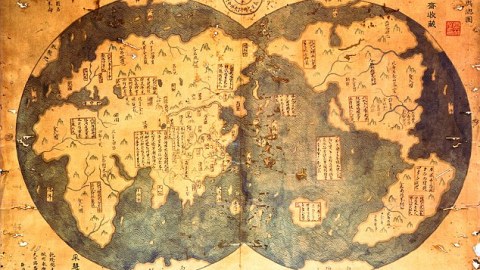Did the Chinese Discover America?

The title of Gavin Menzies’s new book Who Discovered America? is not a rhetorical question. The controversial British historian offers the image above – a 1418 Ming Dynasty map credited to the legendary Chinese Admiral Zheng He – as evidence that Chinese explorers had detailed knowledge of the Western Hemisphere long before Columbus set sail.
This is a claim that Menzies has made before, in his bestseller, 1421. His latest book, however, purports to offer new evidence, and makes even more audacious claims.
On its face, this revisionist history is plausible. After all, China did possess the most formidable naval fleet of the 15th century. The problem with Menzies’s claims over the years, however, lies in the evidence, or lack thereof. Part of the problem is that xenophobic Confucian officials destroyed records of these voyages. The other problem is that Menzies, an amateur historian (some would say pseudo-historian) has a reputation for playing fast and loose with the evidence when there doesn’t appear to be any smoking gun.
This has not stopped Menzies from making claims that Columbus, Magellan and James Cook used maps of Chinese origin to find the New World, and that it was the Chinese who sparked the Italian Renaissance.
Now here’s the latest bombshell.
Admiral Zheng He, according to Menzies, was simply one of a long line of Chinese travelers who first populated North America. These travelers did not come by land across the Bering Strait, as mainstream theories would have it. Menzies argues that they sailed across the Pacific 40,000 years ago.
So how seriously are we to take Menzies’s claims? If you ask people in the academic community, you get responses like this one from University of London history professor Felipe Fernandez-Armesto (via the Daily Telegraph): Menzie’s books are “‘the historical equivalent of stories about Elvis Presley in (the supermarket) and close encounters with alien hamsters.'”
Menzies is not without his defenders in academia, however, and he has been bestowed with honors such as honorary professor at Yunnan University in China. At the very least, Menzies is providing value as an outsider who is asking questions that we don’t have satisfactory answers to.





